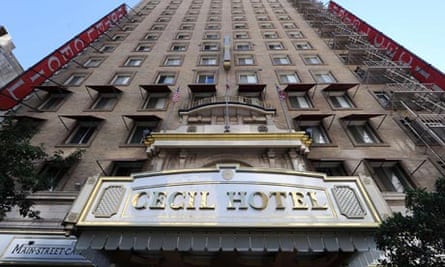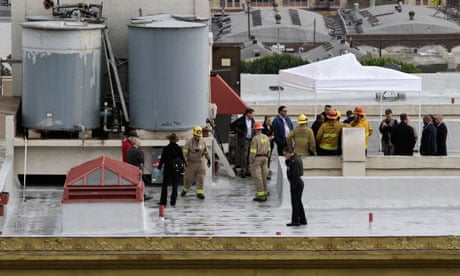The body of a missing Canadian woman has been discovered in a cistern that was being used to provide drinking water to guests in a Los Angeles hotel.
The remains of Elisa Lam, 21, were found by a maintenance worker at the 600-room, $65-a-night Cecil Hotel after guests complained about low water pressure. Detectives were working to determine if her death was the result of foul play or an accident.
British tourist Michael Baugh, 27, and his wife, who had complained about the poor water flow after days of showering, brushing their teeth and drinking some of the tap water, were shocked at the discovery. "We feel a bit sick to the stomach, quite literally, especially having drank the water. We're not well mentally," he said.
Los Angeles' county department of public health officials issued a do-not-drink order on Tuesday while its laboratory tested the water. The disclosure contradicts a previous police statement that the water had been deemed safe.
Terrance Powell, a director co-ordinating the department's response, said the water was also used for cooking in the historical hotel near Skid Row, adding that a coffee shop in the hotel would remain closed and has been instructed to sanitise its food equipment before reopening.
"Our biggest concern is going to be faecal contamination because of the body in the water," he said. The likelihood of contamination is "minimal" given the large amount of water the body was found in, but the department is exercising caution.
Powell said the hotel had hired a water treatment specialist to disinfect its plumbing lines.
A Los Angeles police department sergeant, Rudy Lopez, said Lam's death was being treated as suspicious and a coroner would be conducting a postmortem examination.
Lam, from Vancouver, British Columbia, travelled alone to Los Angeles on 26 January and was last seen five days later by workers at the hotel. Officials said she had been in touch with her family daily until her disappearance.
The hotel has four cisterns on its roof – each about 10 ft (3 metres) high and 4.5 ft wide. Each one holds at least 1,000 gallons (3,785 litres) of water pumped up from city pipes. Lam's body was found on Tuesday at the bottom of a cistern that was about three-quarters full of water, Lopez said.
The opening at the top of the cistern was too small to accommodate firefighters and equipment, so they cut a hole in the storage tank to recover Lam's body.
To get to the tanks, which are on a platform at least 10 ft above the roof, someone would have to go to the top floor then climb a staircase and enter a locked door and turn off an emergency alarm that prevents roof access. Another ladder would have to be taken to the platform and a person would have to climb the side of the tank. Lopez said there were no security cameras on the roof.
The Cecil Hotel was built in the 1920s and refurbished several years ago. It had once been the occasional home of serial killers such as Richard Ramirez, known as the Night Stalker, and Austrian prison author Jack Unterweger, who was convicted of murdering nine prostitutes in Europe and the US.

By midday on Wednesday, hoteliers had moved most of its guests to other premises, Powell said. Those who chose to remain were required to sign a waiver acknowledging they had been informed of the health risks and were being provided bottled water.
Baugh and his wife, who were on their first trip to the US, had planned to go to SeaWorld on Wednesday. Instead, they were looking for a new hotel. They said their tour agency had placed them in another central building with a dubious reputation. "We're just going from one dodgy place to another," he said. "But at least there's water."
